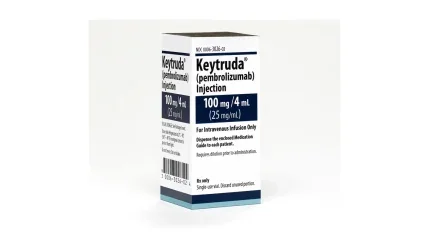
Merck, known as MSD outside the US and Canada, has received approval from the Japanese Ministry of Health, Labor and Welfare (MHLW) for Keytruda (pembrolizumab) in certain lung and urothelial cancer indications.
Keytruda is now approved as a combination treatment with chemotherapy for non-small cell lung carcinoma (NSCLC) as a neoadjuvant therapy, followed by monotherapy as an adjuvant treatment.
The anti-PD-1 therapy is also approved in combination with Padcev (enfortumab vedotin-ejfv) for first-line treatment of radically unresectable urothelial carcinoma.
Additionally, the drug has been approved for monotherapy in patients with radically unresectable urothelial carcinoma who cannot receive platinum-containing chemotherapy.
Merck Research Laboratories global clinical development oncology head and senior vice president Marjorie Green said: “For certain patients in Japan who are diagnosed with resectable non-small cell lung carcinoma and radically unresectable urothelial carcinoma, there is a need for new, effective treatment options.
“With these new approvals, we look forward to providing Keytruda as monotherapy and in combination with other treatment regimens as we aim to address the unmet needs of these patients.”
The approval for NSCLC is based on the Phase 3 KEYNOTE-671 trial results.
This study showed that pembrolizumab plus chemotherapy, followed by Keytruda as monotherapy after surgery, significantly improved overall survival (OS).
Patients experienced a reduction in the risk of death compared to those receiving placebo plus chemotherapy.
The approval for radically unresectable urothelial carcinoma is based on the first interim analysis of the Phase 3 KEYNOTE-A39 trial.
This trial involved 886 chemotherapy-naïve patients and compared the combination to gemcitabine plus cisplatin or carboplatin.
Results showed that the pembrolizumab plus enfortumab vedotin regimen significantly improved OS and lowered the risk of death by 53%.
The last indication was approved based on results from the Phase 2 KEYNOTE-052 trial, which evaluated Keytruda monotherapy in 370 chemotherapy-naïve patients.
Keytruda is a humanised monoclonal antibody that blocks the interaction between PD-1 and its ligands, PD-L1 and PD-L2.
Merck’s immuno-oncology clinical research programme currently involves over 1,600 trials studying pembrolizumab across various cancers and treatment settings.
The programme aims to explore Keytruda’s role in different cancers and identify factors that may predict patient responses to the treatment.
The latest development follows the recent European Commission (EC) approval of Keytruda with Padcev to treat certain types of urothelial cancer.






